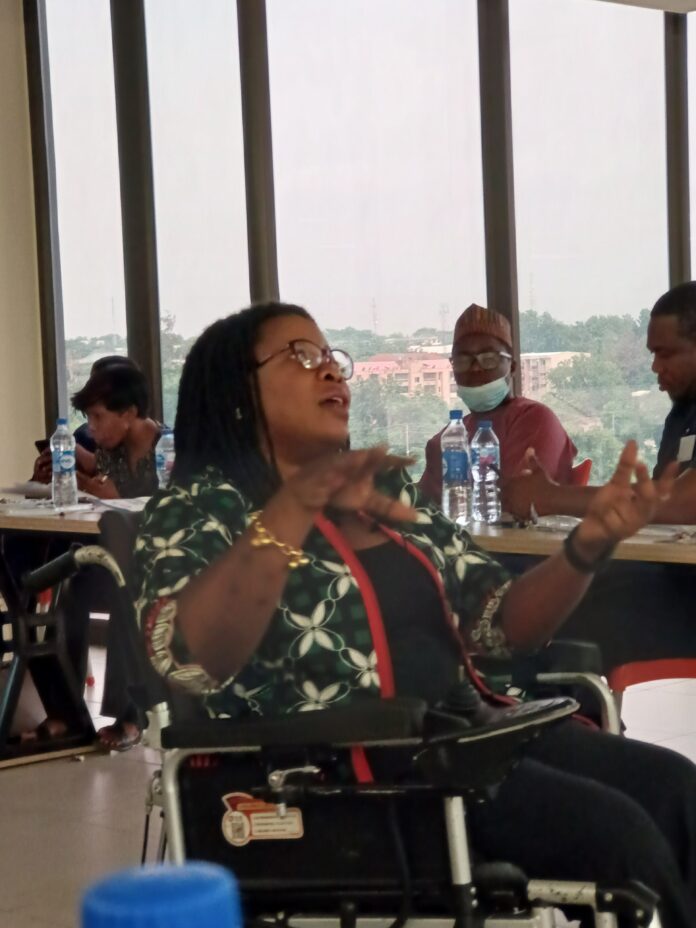The Center for Journalism Innovation and Development (CJID) has said lack of adequate facilities in banks has excluded about 27 million Persons With Disabilities (PWDs) from access to financial institutions in Nigeria.
Its Deputy Director Busola Ajibola, made this known Monday in Abuja at a two-day training on disability reporting for the media organised by the center, in collaboration with the Disability Right Advocacy Center (DRAC), Inclusive Friends Association (IFA) and The Albino Foundation (TAF).
Ajibola expressed worry that this huge number of persons are neglected and not put into consideration as such the possible revenue institutions would have accrued from them is lost.
She also lamented that three years on, the disability bill accented to by Muhammadu Buhari an passed into law by the 9th National Assembly is yet to be implemented, hence the continued neglect of the needs of people with disabilities.
“Take for instance the Disability Right Act passed since 2019, PWDs still suffer neglect irrespective of the fact that we have laws that have been passed that can address their needs,” she said.
“It is estimated that 27million PWD’s are in Nigeria and these persons are excluded from the financial institutions.
“Most banks in Nigeria have no provisions for persons with disability, except for very few and not only that they have excluded these persons but that they have lost patronage of this huge number of persons and revenue,” she added.
Ajibola further noted the poor educational system effects on PWD’s, stressing that addressing their needs is beyond having seperate schools as this alienates them from the society and makes it difficult for them to interact with persons without disability.
“There are cases where teachers have reportedly beaten student with disabilities because they seem to not catch up with teachings, this will not help the child, rather they loose their confidence.Teachers need to be trained on how to manage children with disability as a trained teacher will understand that flogging the child only worsen the situation.
The Deputy Director therefore tasked Journalists on impactful reporting that will depict the true situation of what persons with disabilities suffer in the community to enable them get the intervention on their human rights.
“When we exclude some particular set of persons in our reporting, we have actually lost them.When you want to tell the story of PWD, tell it with their words, reach out to people who live the reality.
“Media reports on persons with disability must be inclusive and sustainable as disability can be acquired not neccesarily having it from conception. Writing stories on PWD’s could be solving a situation for oneself as some disabilities are acquired in later life.
On his part, Jake Ekpelle, Executive Director, TAF, regretted that disability is most times associated with begging, needing help and charity, stressing that this is a wrong impression as PWD’s often times do not appreciate unsolicited help.
Ekpelle reiterated that in stating the issues of disability it is important to be diplomatic “tell the truth with love without hurting.”
He acknowledged that issues of disability is prevalent but there will be no success without problems,as success is recorded through solving problems.
Similarly, Head of Programs at DRAC Nigeria, Amaka Agwu, stressed the need to stop the reports that centers on pity or call out their disability, as this puts them in the light or public space for the wrong reasons.
Agwu said, “it is important to display pictures in stories, but pictures that exposes vulnerability of PWD is inappropriate this is because you are using the persons disability to describe the person and it should not be so,as this is wrong and stereotypical.
“Yes we understand the importance of telling the stories of persons with disability but these stories must be captured in dignity, as an expression of their human right.
Also, Chris Agbo, of Qualitative Magazine, one of the participants stated that when the opportunity of a PWDs to speak for themselves is denied, it is also discrimination.
“By assuming solutions for a PWD is already discriminatory. This issues easily limits PWD because of the mindset already construed by the authorities and public,” he said.


